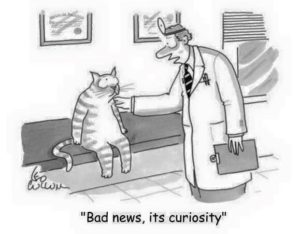Over the last couple of months, I have tried to grasp the characteristics or inner needs that drive our actions. Again, actions are the results or responses we decide to make as we live out our core. Our core is part and parcel of who we are. We do not choose to be wanted and accepted, it is a part of our core or center characteristic. Actions based upon this core have moral consequences. Actions are never done in isolation. Actions are what we do in response to our innermost. These actions require an act of the will. An example: I have an inner desire for consumption of food, but it is an act of the will to consume good food or not so good food. Decisions carry with it consequences. If someone would step on my toe in a crowded elevator, I would feel pain; no decision on my part it is a part of being alive. But if I lashed out at the perpetrator of the pain and punched him in the nose, that is a decision and has consequences. Pain is part of being how I am. Purposely inflicting pain on someone else’s nose is a decision-making process.
So far in my list of inner wants or core needs I have covered acceptance, curiosity, consumption, and family. The next on the list is probably the most problematic. Problematic in that our society seems to display the actions that would not express this characteristic. That characteristic is honor.
Honor as defined in the Bible as kabod in the Old Testament meaning heavy or weighty. To honor someone is to give weight or give respect and even authority over your life, and timao in the New Testament. It is characterized as granting honor because of respect, courtesy, and reverence. Both words speak of acts of honor. Never-the-less, I believe there is an inner desire to acknowledge others with honor.
An example of this characteristic is when I worked for Intel Corporation. I was asked to go on a sales call with a large customer to be a technical advisor to the discussion. I felt that I should give the honor to the customer to dress well and be on my best behavior. I put on a fresh shirt and a moderate tie under my suit coat and went to the meeting. At the meeting table prior to introductions the prospective buyers constantly asked me questions and almost ignoring the sales manager to which I was there to support. The sales manager was not wearing a tie or for that matter acted disinterested in the goings-on of the meeting. The company staff was referring to me because of my clothes and demeanor. To the chagrin of my sales manager, he was being ignored and I was being honored.
For the most part, most do not act rudely. Most take care not to offend. Most react to the honor urge in positive ways. It is an internal attitude of that should be nurtured. It is only when we respect, and honor others will others do the same. While the reception of honor is a positive experience, it is not to be sought ( Luke 14:7-8 ). When honor comes from others by reason of position or status, it is not to be taken for granted. The recipients should seek to merit honor through godly character.
The granting of honor to others is an essential experience in the believer’s life. Christians are to bestow honor on those for whom honor is due. The believer is to honor God, for he is the sovereign head of the universe and his character is unsurpassed. The believer is to honor those in positions of earthly authority, such as governing authorities ( Rom 13:1-7 ), masters ( 1 Tim 6:1 ), and parents ( Exod 20:12 ). As a participant in the church, the believer is also called to honor Jesus Christ, the head of the church ( John 5:23 ), fellow believers ( Rom 12:10 ), and widows ( 1 Tim 5:3 ).
Honor, now that is deep!
Comments welcomed.



 The only being that is completely self-sufficient is God, all others must and are driven to consume. If you don’t, you die. Whether it is good for you vegetables, or not so good for you half-pound hamburger covered with cheese and accompanied by greasy fried potatoes, you will consume. Again, this is a motive or a decision point that you must come to order for you to live. The desire to incorporate something outside of yourself is neither right or wrong, it is part of being God’s creation. We come into the realm of good and bad is when we start making the decision as to how to satiate that desire.
The only being that is completely self-sufficient is God, all others must and are driven to consume. If you don’t, you die. Whether it is good for you vegetables, or not so good for you half-pound hamburger covered with cheese and accompanied by greasy fried potatoes, you will consume. Again, this is a motive or a decision point that you must come to order for you to live. The desire to incorporate something outside of yourself is neither right or wrong, it is part of being God’s creation. We come into the realm of good and bad is when we start making the decision as to how to satiate that desire.